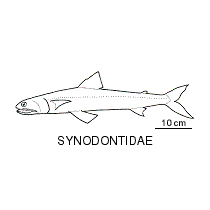- Classification
- ACTINOPTERYGII
- AULOPIFORMES
- SYNODONTIDAE
-
Fish Classification
-
Class
ACTINOPTERYGII Ray-finned fishes -
Order
AULOPIFORMES Lizardfishes ... -
Family
SYNODONTIDAE Lizardfishes
Family SYNODONTIDAE
More Info
|
Family Taxonomy |
The family Synodontidae comprises four genera, Harpadon, Saurida, Synodus and Trachinocephalus, and more than 70 species. All genera and 27 described species are known from Australian waters. The family is in need of revision, and a number of undescribed species are known from Australia. |
|
Family Distribution |
Lizardfishes are found in tropical and subtropical waters worldwide. They live in areas ranging from shallow estuaries and sheltered inshore bays to offshore continental shelf habitats. These bottom-living fishes (demersal) are found on reefs and in sandy to somewhat muddy environments in very shallow waters down to depths of about 300m, although most species occur much shallower. Members of the genus Harpadon are known to gather in large schools to feed in river deltas during the monsoon season. |
|
Family Description |
Mersitics: D 10-14. Lizardfishes have elongate, cylindrical bodies, with 'lizard-like' heads, large mouths with long jaws containing many small sharp slender teeth. They have a small adipose fin and lack fin spines. The dorsal fin is short-based and relatively high. |
|
Family Size |
Maximum size about 70cm, although most species are much smaller. |
|
Family Colour |
Most Lizardfishes are well-camouflaged to match their surroundings, and usually have a series of irregular blotches and bands, with various lighter and darker markings. Many species are reddish in colour. |
|
Family Feeding |
Lizardfishes are voracious and aggressive carnivores that feed on small fishes and crustaceans. They are well-camouflaged and can bury themselves in the sediment with only their eyes showing while waiting for passing prey. Divers often see them darting up off the bottom to seize small fishes and shrimps. |
|
Family Reproduction |
Although most fishes of the order Aulopiformes are hermaphrodites (individuals have both male and female reproductive tissue at the same time), the sexes are usually separate (dioecious) in lizardfishes. They often live in pairs, and fertilisation is external. The pelagic larvae have a series of 3-13 paired black pigment blotches running along the length of the gut. This pigment is retained internally on the gut following settlement. |
|
Family Commercial |
Although of no commercial value in Australian waters, lizardfishes of the genus Harpadon (Bombay Duck) are targeted in South and Southeast Asia. They are collected in bottom trawls, and with bag-nets (dol nets) set against tidal currents, with the largest catches occurring in India and Indonesia. Harpadon flesh is marketed fresh, salted, dried or smoked. Other species are regularly taken as bycatch in trawl fisheries. |
|
Family Conservation |
Not evaluated. |
|
Author |
Dianne J. Bray |
References
Allen, G.R. and R. Swainston, 1988. The marine fishes of north-western Australia: a field guide for anglers and divers. Western Australian Museum, Perth. 201 pp.
Allen, G.R., R.C. Steene &M. Orchard. 2007. Fishes of Christmas Island. Christmas Island Natural History Association, Christmas Island, Indian Ocean, Australia. 284 p.
Allen, G.R. & W.F. Smith-Vaniz. 1994. Fishes of the Cocos (Keeling) Islands. Atoll Res. Bull. 412: 21 p.
Baldwin, C.C. & Johnson, G.D. 1996. Interrelationships of Aulopiformes. pp. 355-404 in Stiassny, M.L.J., Parenti, L.R. & Johnson, G.D. (eds). Interrelationships of Fishes. San Diego : Academic Press 496 pp.
Cressey, R.F. 1986. Synodontidae. p. 270-273. In M.M. Smith and P.C. Heemstra (eds.) Smiths' sea fishes. Springer-Verlag, Berlin.
Fishelson, L., D. Golani, B. Galil & M. Goren. 2010. Comparison of taste bud form, number and distribution in the oralpharyngeal cavity of lizardfishes (Aulopiformes, Synodontidae). Cybium 34(3): 269-277.
Francis, M.P. 1993. Checklist of the coastal fishes of Lord Howe, Norfolk, and Kermadec Islands, Southwest Pacific Ocean. Pac. Sci. 47(2): 136-170.
Hoese, D.F., D.J. Bray, J.R. Paxton and G.R. Allen. 2006. Fishes. In Beesley, P.L. and A. Wells (eds.) Zoological Catalogue of Australia. Volume 35. ABRS & CSIRO Publishing: Australia Part 1, pp. xxiv 1-670; Part 2, pp. xxi 671-1472; Part 3, pp. xxi 1473-2178.
Inoue, T. & T. Nakabo. 2006. The Saurida undosquamis group (Aulopiformes: Synodontidae), with description of a new species from southern Japan. Ichthyol. Res. 53(4): 379-397.
Johnson, J.W. 1999. Annotated checklist of the fishes of Moreton Bay, Queensland, Australia. Memoirs of the Queensland Museum 43(2): 709-762.
Nelson, J.S. 2004. Fishes of the World. New York : John Wiley & Sons.
Randall, J.E. 2009. Five new Indo-Pacific lizardfishes of the genus Synodus (Aulopiformes: Synodontidae). Zoological Studies 48(3): 407-417.
Randall, J.E., G.R. Allen and R.C. Steene. 1990. Fishes of the Great Barrier Reef and Coral Sea. University of Hawaii Press, Honolulu, Hawaii. 506 p.
Russell, B.C. 1999. Families Synodontidae, Bathysauridae. pp. 1928-1947 in Carpenter, K.E. & Niem, V.H. (eds). The Living Marine Resources of the Western Central Pacific. FAO Species Identification Guide for Fisheries Purposes. Rome : FAO Vol. 3 1397-2068 pp.
Russell, B.C. and R.F. Cressey. 1979. Three new species of Indo-west Pacific lizardfish (Synodontidae). Proc. Biol. Soc. Wash. 92(1): 166-175.
Russell, B.C. and W. Houston. 1989. Offshore fishes of the Arafura Sea. Beagle 6(1): 69-84.
Sainsbury, K.J., P.J. Kailola and G.G. Leyland. 1985. Continental shelf fishes of the northern and north-western Australia. CSIRO Division of Fisheries Research; Clouston & Hall and Peter Pownall Fisheries Information Service, Canberra, Australia. 375 p.
Salini, J.P., S.J.M. Blaber and D.T. Brewer. 1994. Diets of trawled predatory fish of the Gulf of Carpentaria, Australia, with particular reference to predation on prawns. Aust. J. Mar. Freshwat. Res. 45(3): 397-411.
Thresher, R.E. 1984. Reproduction in reef fishes. T.F.H. Publications, Inc. Ltd., Neptune City, New Jersey. 399 p.



































































































































